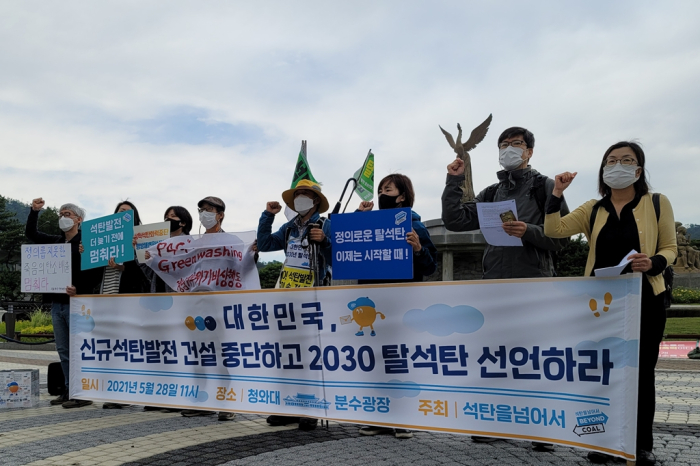ESG
KoreaŌĆÖs coal power companies squeezed for financing amid ESG fever
They are unwelcomed as pensions and other big investors turn a cold shoulder on them
By Jun 18, 2021 (Gmt+09:00)
3
Min read
Most Read

South KoreaŌĆÖs coal power companies are facing tighter scrutiny for debt financing as they are increasingly shunned by financial investors amid the growing adoption of environmental, social and governance (ESG) standards in investment.
Industry officials are expressing concerns that the pursuit of ESG theme, introduced as an incentive for business activities, could work as a regulatory stumbling block in corporate financing.
According to the investment banking industry on June 18, Samcheok Blue Power Co. failed to attract any institutional investor during the bookbuilding on Thursday for its 100 billion won ($88 million) in a corporate bond issue.
With no interest from any institutional investors, the planned bond issue will be taken over by the coal power companyŌĆÖs bond sale managers, including NH Investment & Securities Co.
The aborted corporate bond sale came after local credit rating agencies cut their outlook for the coal power companyŌĆÖs 3-year AA-minus-rated bonds to negative from stable, reflecting unfavorable market views on coal-related businesses.
Other non-government coal power companies such as Gangneung Eco Power Co., Goseong Green Power Co. and GS Donghae Electric Power Co. also face a downgrade in their credit outlook by local rating companies, finding it increasingly hard to refinance their projects or roll over maturing debt.
ŌĆ£With the strengthening of ESG investments, brokerage companies are reluctant to manage the sale of bonds issued by carbon emitters. This, in turn, is working as pressure for such companies to get debt financing,ŌĆØ said an industry official.

BIG INVESTORS TURN COLD SHOULDER ON COAL FIRMS
KoreaŌĆÖs major lenders, one after another, have declared they are ending support for coal-related companies as investors worldwide are moving away from coal projects, along with oil and natural gas exploration, instead pouring money into renewable energy such as solar and wind power.
KoreaŌĆÖs biggest fund managers, including Hanwha, KB Asset Management and Shinhan BNP Paribas, have indicated they will step back from funding the countryŌĆÖs coal industry amid growing protests by environmental activists against greenhouse gas emission-related projects.
Last month, the National Pension Service (NPS), KoreaŌĆÖs biggest institutional investor, said it is excluding from its portfolio some of new coal-fired power development projects at home and abroad.
The pension fund said it is introducing negative screening to exclude or curtain investments in industries or companies with low ratings on ESG standards, a move that could impair financing by companies like Korea Electric Power Corp. (KEPCO), steelmaker POSCO and petrochemical companies.
The industry-wide push for ESG movements is in line with the Moon Jae-in administrationŌĆÖs pledge in October that the country would achieve carbon neutrality by 2050 and spend 8 trillion won on environmentally-friendly growth initiatives.

With financial investorsŌĆÖ cold shoulder against coal-related businesses, state-run power companies also seem to have difficulty financing in the credit market.
The power-generating affiliates of KEPCO are being asked to pay higher yields than similarly rated state-run firms when issuing bonds, according to industry officials.
ŌĆ£With pension funds turning their back against coal power companies, they are unwelcomed in the local bond market,ŌĆØ said a bond trader.
Write to Geun-Ho Im and Eun-Jung Kim at eigen@hankyung.com
In-Soo Nam edited this article.
More to Read
-
 Net zero emissionsIn the crosswinds of coalŌĆÖs clean transition
Net zero emissionsIn the crosswinds of coalŌĆÖs clean transitionMay 26, 2021 (Gmt+09:00)
5 Min read -
 ESG investingNPS adopts limited negative screening on high emitters
ESG investingNPS adopts limited negative screening on high emittersMay 28, 2021 (Gmt+09:00)
2 Min read -
 KEPCO set to finance $190 mn for VietnamŌĆÖs coal power plant project
KEPCO set to finance $190 mn for VietnamŌĆÖs coal power plant projectOct 05, 2020 (Gmt+09:00)
3 Min read -
 KB Financial to end coal project financing for low-carbon economy
KB Financial to end coal project financing for low-carbon economySep 28, 2020 (Gmt+09:00)
2 Min read -
 South Korea moves in on overseas coal project financing ban
South Korea moves in on overseas coal project financing banAug 24, 2020 (Gmt+09:00)
4 Min read
Comment 0
LOG IN




